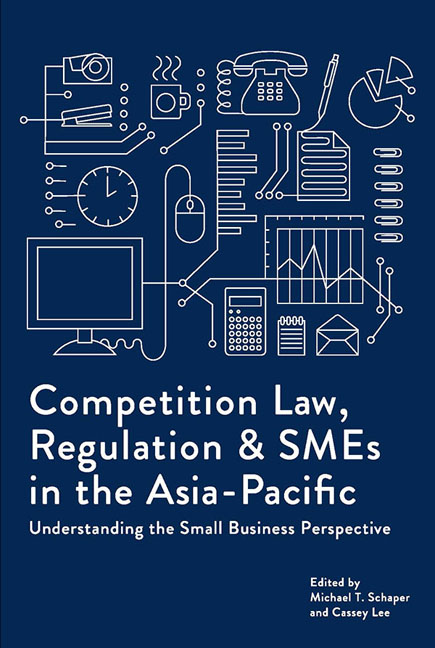 Competition Law, Regulation and SMEs in the Asia-Pacific
Competition Law, Regulation and SMEs in the Asia-Pacific Book contents
- Frontmatter
- Contents
- Foreword
- About the Contributors
- 1 Introduction: Making the Invisible SME More Visible in Competition Policy and Law
- Section 1 Theories And Basic Concepts
- Section 2 Smes And Competition Law
- 7 The Application of Per Ses to Smes: The Type 1 Error No One Notices?
- 8 Enforcing Competition Law Against SMEs: Presumptions and Problems
- 9 How Competition Law May Affect Franchised Smes in Apec Economies
- 10 Chinese Family Firms in Southeast Asia: Special Problems for Competition Law?
- 11 Trade Associations: Competition Law Advocates or Offenders?
- Section 3 Country Studies
- Index
11 - Trade Associations: Competition Law Advocates or Offenders?
from Section 2 - Smes And Competition Law
Published online by Cambridge University Press: 05 August 2017
- Frontmatter
- Contents
- Foreword
- About the Contributors
- 1 Introduction: Making the Invisible SME More Visible in Competition Policy and Law
- Section 1 Theories And Basic Concepts
- Section 2 Smes And Competition Law
- 7 The Application of Per Ses to Smes: The Type 1 Error No One Notices?
- 8 Enforcing Competition Law Against SMEs: Presumptions and Problems
- 9 How Competition Law May Affect Franchised Smes in Apec Economies
- 10 Chinese Family Firms in Southeast Asia: Special Problems for Competition Law?
- 11 Trade Associations: Competition Law Advocates or Offenders?
- Section 3 Country Studies
- Index
Summary
For centuries, trade associations throughout the world have played a critical role representing businesses, providing services such as lobbying governments, conducting research and providing various forms of assistance to their members. This chapter argues that trade associations must widen these historic functions. Trade associations are in a special position not only to help educate small and medium-sized enterprises (SMEs) about competition law compliance, but also to assist them in utilizing the rules to their advantage. Their precise role will vary depending on the age and sophistication of the competition regime. In jurisdictions that have recently adopted competition statutes, such as Malaysia and Singapore, trade associations are still often breaching the law, so the focus must be on educating themselves and their members on compliance. In more experienced regimes such as the United Kingdom and Australia, trade associations can bring representative actions or make applications for exemptions on behalf of their members. The question of whether trade associations are resourced to fulfil this widened role is also considered.
Introduction
As small and medium-sized enterprises (SMEs) face an increasingly globalized business world, their ability to remain competitive is essential. In many countries around the world, SMEs make up more than 90 per cent of the number of businesses with the majority of that 90 per cent being micro-businesses (Schaper 2010). Faced with increased regulation, globalization, and competition, many SMEs will need increased guidance and support. Trade associations are well-placed to offer assistance. As competition laws become increasingly widespread and important around the world, this is one area where help is needed.
The number of economies with competition laws has increased dramatically in recent years, with established regulatory frameworks now in place in more than 120 jurisdictions (Dabbah 2010), and several others in the process of introducing their own statutes. Of particular note is the introduction of competition law in ASEAN (Association of Southeast Asian Nations) member countries, which is a target of the ASEAN Economic Community Blueprint.
The complexities of competition law are thus being faced by SMEs around the world. Trade associations provide a forum for SMEs to work collectively rather than face these challenges individually. Ironically, however, such bodies can also provide a forum for competition laws to be breached when competitors meet regularly to discuss business issues. Competition authorities are therefore often understandably suspicious of trade association activities.
- Type
- Chapter
- Information
- Competition Law, Regulation and SMEs in the Asia-PacificUnderstanding the Small Business Perspective, pp. 192 - 208Publisher: ISEAS–Yusof Ishak InstitutePrint publication year: 2016
